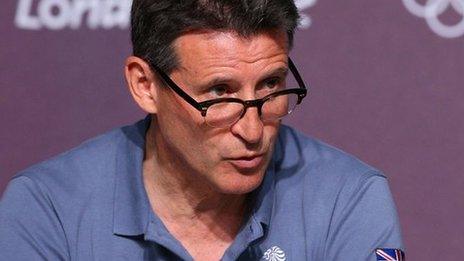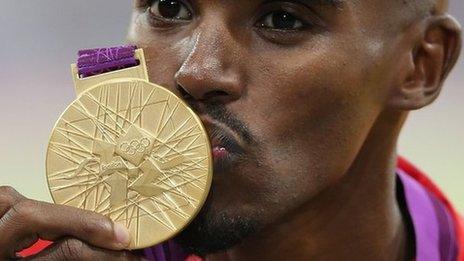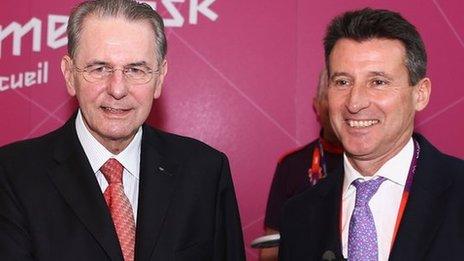James Cracknell on life after competing in the Olympic Games
- Published
BBC Sport's 20 most memorable moments from London 2012
Without doubt, the UK has just witnessed the biggest sporting summer ever. The country had a rare reason to smile and celebrate a blissful few weeks. The gold medals came pouring in, so for a competitor, what was there possibly not to like?
For the athletes, the days of competition provided the ultimate moment in their lives. Many were pitched from obscurity to stardom in a matter of days, or were subjected to the rigour of scrutiny and had to account for how they performed in victory or defeat.
The image that you were left with was that successful Olympians and Paralympians leave the event incredibly satisfied and fulfilled with their medal. The other side of the coin is that some will face a situation where they have spent four intense years of sacrifice only to come up short.
For those who tasted success, they think they're happy, and they might be in the first week, but afterwards they may well find that life isn't so rosy. Having achieved their goal, they may struggle setting another one, questioning their motivation or asking if they could possibly do it all again.
People cope with success and failure in different ways. Many will come back into the fray for the best of reasons.
Before London 2012, British long jumper Greg Rutherford was ravaged by injury and had under-performed in Beijing, but he managed to get his form and his body in the right place at, crucially, the right time.
It was brilliant to see him get so much satisfaction from it as he won gold. Rutherford has seen both the bad side and the good from competing at the highest level.
In London 2012: What Now?, broadcast first on Wednesday 17 October 2012, he talks about the highs and lows of his career and, in many ways, his experience has given him the ideal perspective.
The 25-year-old saw the faces of competitors and team-mates after London 2012 when he was celebrating and some were devastated at not doing well, but speaks about how he went to talk to them and comfort them.
He said: "After Beijing I thought, 'It's not going to happen'. I spoke to those guys who hadn't done so well and I understood what they were feeling, as most of my career [before London] I'd been gutted. When things don't go well you can't let it define you."
British sailor Pippa Wilson - who I hesitate to call one of the "three blondes in a boat" because it sounds like they were playing rather than competing in a serious sport - actually fell away from the sport after winning gold in Beijing and didn't compete in London when her event was changed.
She talks about how she "lost her personality" through having to devote so much time and energy to the sport, sacrificing her social life and friendships, something she didn't know if she was prepared to do. After the 2008 Games she said she "literally didn't know what to do with herself". In the Radio 5 live programme she talks about her state of mind now and thoughts on competing in Rio 2016.
British cyclist Jody Cundy, who had done well in Beijing but memorably lost his rag at the London Paralympics after being disqualified in the C4/5 1km cycling time trial, said: "I felt like somebody died. The thought was that the four years were a waste and you didn't get a chance to race, so it was out of your control."
Double Olympic gold medallist Dame Kelly Holmes, who established the Kelly Holmes legacy Trust, which among other things helps support athletes in the after-Games period, spoke about her own journey after experiencing the highs and lows of competition and what effect it had on her.
Olympics: The funny side of London 2012
The programme also spoke to a former US Olympian, Taraje Williams-Murray, who is convinced that post-Olympic stress disorder exists, and a sports psychologist who has worked with Olympians about the emotional legacy that impacts on athletes after the Games.
As my wife, Bev, says, a telling stat is that of the 13 British gold medal-winning rowers at Sydney in September 2000, only two were in the same personal relationships by that Christmas.
Ultimately, team members might look the same in their Team GB kit, but they don't think the same. For me I was lucky I competed alongside two blokes - Sir Steve Redgrave and Sir Matthew Pinsent - who had done it before, whether it was success or failure, and that helped me.
My dad would still ask me when I was going to get a proper job and Bev and the family were hugely supportive in keeping me grounded after the Games.
- Published7 November 2012

- Published12 August 2012

- Published14 October 2012
